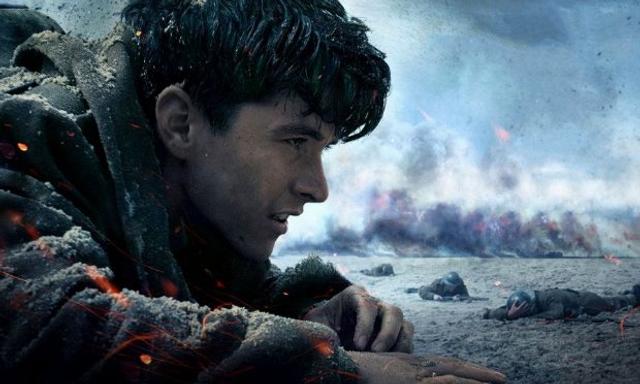If Christopher Nolan's filmography could be described in one word, it's this - varied.
In the space of seventeen years, he's made ten films - three of which formed the Dark Knight trilogy - that have had varying degrees of commercial and critical success, but each unique in their own way. Beginning with Following, a film that took Nolan over a year to shoot, his work since then has steadily increased in budget and recognition.
We've counted down his best films and ranked them in order, and yes, Dunkirk has been added to the ranking. Got your own take? Think The Prestige or Inception should be higher?
10. INSOMNIA (2002)
Although it's a remake of a Norwegian film, Nolan manages to take Insomnia's plot and turn it into his own thing. It works, for the most part, but there is something too slight and unintelligent about Insomnia that makes it arguably his weakest film. Al Pacino plays against himself as a hardened LAPD detective, sent to the wastes of Alaska, to investigate the murder of a teenager and to contemplate his next move following an investigation by Internal Affairs. The town, however, is bathed in perpetual daylight thanks to its nearness to the Arctic Circle. The investigation leads them to the door of Robin Williams during his One-Hour Photo phase and the film sets off from there. In a way, the faults with the film aren't Nolan's - they're with the original film itself, and Nolan is simply retreading them despite his best attempts at righting the wrongs. It's still an interesting watch, especially as how you can see Nolan's style develop from where it was then to where it is now.
9. FOLLOWING (1998)
A black-and-white film shot over the course of a year, Following's now become a cult favourite with Nolan diehards. A wimpy writer gets taken in by a smartly-dressed thief named Cobb (yes, he reused the name for Inception) who breaks into people's houses for fun. At first, the writer's unsure of what he's doing and why he's doing, but becomes more voyeuristic with each job and decides to keep at it. The film went largely unnoticed until Memento became the smash-hit and was subsequently reevaluated. For the most part, it works as an experimental college film and you can see the first, tentative styles that Nolan uses later on. It's an interesting watch, when considered against his later work, but not all that exciting on its own merits.
8. THE DARK KNIGHT RISES (2012)
The sad thing about The Dark Knight Rises is that, when compared to The Dark Knight and Batman Begins, it just doesn't stack up. You can almost see how exhausted Christopher Nolan was by Batman, not to mention how he had to hurriedly rewrite the film with the unfortunate death of Heath Ledger. When you take that into consideration, The Dark Knight Rises comes across more as a noble attempt to bring to a close one of the greatest comic-book adaptations ever made. It's a tough task, especially for a director who began his career making quirky noir detective dramas. Nevertheless, The Dark Knight Rises does have some strong moments - including a particularly bone-crunching fight between Bane and Batman.
7. INTERSTELLAR (2014)
When Christopher Nolan closed off his tenure with Batman and the annals of comic-book history, everyone was expecting him to go much more personal and restrained the next time. In a way, that's sort of what happened. Interstellar is, by far, his most personal and emotional film to date. Strip away the layers of interplanetary travel, an A-list actor kept completely in the dark during press promotion and Hans Zimmer's soaring score and you have a story about what it's like being a father. Although Nolan may have tackled this subject before with Inception, he never so clearly aimed the film on the topic as he did here. It might have been somewhat disappointing, but subsequent viewings are needed to fully appreciate it.
6. BATMAN BEGINS (2005)
Wind the clocks back to 1997 and Joel Schumacher's horrendously awful / funny Batman & Robin. Nobody could have predicted that Batman would jettison its neon-drenched, '60s-inspired visuals for something that looked closer to social realism than any comic book film has attempted. In a way, that was part of what made Batman Begins so enthralling on its first viewing. Comic-book characters had never been treated this seriously. Everything was always schewed or winking at the audience, acknowledging the fact that it was all a bit ridiculous. Here, Nolan attempted to make Batman a credible entity - emotionally and figuratively.
5. THE PRESTIGE (2006)
The Prestige was the first of Nolan's post-Batman films, which contrasted heavily with the rigid confines of the Batman universe. The Prestige was an intriguing choice for Nolan; it's his first - and to date, only - adaptation of a novel. For pedants, Memento was a novella - not a novel. Anyway, casting Christian Bale against Hugh Jackman as Victorian-era magicians with a jumbled-up structure that practically begs you to take notes isn't what you'd expect from the guy who reinvented Batman. Yet, as if by magic, The Prestige crawls under your skin. The muted colours work with a story that slowly builds into a crescendo. There are no extended fight sequences, there is no moment of clarity or resonant moment. It's a thoughtful meditation on the price of success and what it means. For Nolan, it could have been a biography. A director who finally had international success - but what did it mean when he had it?
4. INCEPTION (2010)
On the run-up to Inception, there were endless theories as to what exactly the film was about. When it was finally revealed, nobody was exactly sure what to make of it. Of course, that was before we saw it. Even afterwards, we still weren't entirely sure what we saw. But we knew we liked it. A lot. Inception passed over $800 million at the box-office and set off countless arguments as to what the film was about. Was it all a dream? Did the top stop spinning at the end? Who cares. What Inception nailed was effectively blending noir, science-fiction, heist thrillers and a procedural element to a story that could have easily disappeared up its own backside. Endless amounts of analysis on Inception yields various results, but one thing is certain - Inception was a brilliant concept that was handled incredibly well.
3. MEMENTO (2000)
Memento represented Christopher Nolan at his purest. Clever, slyly funny, working with familiar tropes in genre but subverting them for his own ends, stylish. All hallmarks of his later work, all clearly evident on his second film. Casting Guy Pearce, then primarily known for LA Confidential, was an incredibly smart move. So too was Carrie-Anne Moss, who was coming off the back of The Matrix and was signed up for two more, lesser sequels. A fiendishly twisted tale involving murder, tattoos and retrograde amnesia, Memento astounded critics and audiences and - like a lot of his films - begged you to watch it a second time. Never dulling with the passing years, Memento stands up as one of his finest films.
2. DUNKIRK (2017)
You can read our full review of Dunkirk here for a more in-depth reading on Dunkirk. So, yes, it comes close to toppling The Dark Knight as Nolan's best film - but it doesn't. Why not? For us, it's about character development. Dunkirk, as we said in our review, is essentially a survival thriller on a big budget - but it doesn't allow the characters to develop in a conventional way and it ultimately becomes about seeing them at their worst and most desperate - save for one character. It doesn't allow for a full character arc as they're in a constant state of chaos, so you don't really have to something to compare it with. Look, we're nitpicking here, but it's why we couldn't give it the full five stars that we'd give to The Dark Knight.
1. THE DARK KNIGHT (2008)
If Batman Begins took the character out of the comic books and placed him into the real world, The Dark Knight pushed him into Michael Mann's Heat. The blue-drenched cityscapes, the parallels between the two central characters, the highly-constructed heist scenes at the beginning of each film, Heat and The Dark Knight are companion pieces for one another. Nolan's direction was laser-focused, cleverly eschewing what made Batman so interesting - namely, Batman - and brought in one of the most iconic villains in recent film history. Namely, Heath Ledger's take on The Joker. For those of a certain vintage, they'll remember Cesar Romero from the '60s TV series or perhaps Mark Hamill's cackling voice on the Animated Series. Here, Heath Ledger turned The Joker into what he truly was - a psychopathic terrorist who had more in common with Alex DeLarge from A Clockwork Orange than a circus clown. Again, its key to remember that Heath Ledger was - up until this point - known for sensitive roles in Brokeback Mountain and Monster's Ball. Nolan clearly saw something in Ledger that pointed towards the incredible performance he gave as Joker. It's not just all about that, of course. The construction of the story, how detailed and realistic it felt, captured and captivated audiences and set the bar for all future comic-book films that has yet to be surpassed.



















































































